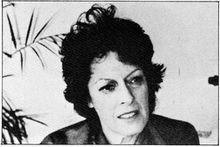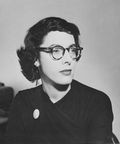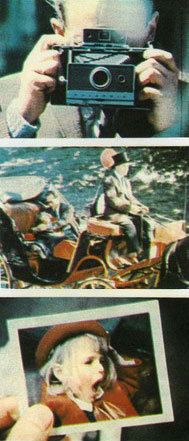(450)To woman copywriter all over the world (2)
Comments of DDB's Copy Chief
"Advertising Age" July 15,1968
interviewer: John Revett
Mrs. Phyllis Robison was named to the New York Advertising Writer's Hall of Fame on May 29.
Q. How did you feel about style and discipline when you were the DDB copy chief? Was there a particular DDB sound or characteristic that you looked for?
 Mrs.Robinson Except for the fact that the work should be fresh and on the button, to the point, and do the work, the selling job, I definitely didn't look for a DDB style.
Mrs.Robinson Except for the fact that the work should be fresh and on the button, to the point, and do the work, the selling job, I definitely didn't look for a DDB style.
I think my own personal style is a very colloquial one, and this was picked up to a certain extent, or maybe I pulled it out of other people; the thing I prided myself on in those years was bringing out the best in other people. We didn't want to make little carbon copies of us.
To say don't do it like this, do it like me, I think is deadly. But to say to someone, I don't think this is right because such, and such and to turn it back and say look back in side yourseif and find the answer---that helps a person grow and gets a better job right away. To have them search themselves for the answer, that's the way you get people to develop their own schtick, their own style.
Q. Were you a tough copy chief?
Mrs.Robinson I think I was tough. I think probably if you asked around you'd get some kind of image like the iron fist in the velvet glove.
I always maintained very genial relations with my writers, happy ones, but I was very tough. I wouldn't pass something unless I thought it was really right, and I've turned things back 20 times.
Q. Do you think copy is too brief these days?
Mrs.Robinson I might have ten years ago. I think today the long, persuasive copy might be coming back in as a style, not that it was ever really out.
Q. Which is harder to write?
Mrs.Robinson Good copy is hard to write. If you're a good writer, you can write long copy or short. It's very difficult to write short copy well.
It takes some different skills to write a long piece of copy and sustain interest.
Q. Do you have any secret ways of getting the good-copy process started, for yourself?
Mrs.Robinson No, I write copy here, I write copy at home, in the bathtub, on the New Haven Railroad. Places aren't important to me, although I try to have regular working habits. But there are two general things I do that are very ingrained in me.
One, I try to drench myself in the product or the story and then---just by free association just let go with any goofy thing about it.
The other is that if I ever---I've been lucky to have never had a writing block---if ever I can't get the hang of something or something seems to be stubborn, a little trick I have is just to get something on paper.
It always works for me; maybe it's because I have so much of the editor in, me I enjoy;
editing my own copy and I can hack it up even if I write something ghastly.
Other people I know don't do that at all.
They have something all polished in their mind first.
But I love to edit my own stuff.
Q. If you were still copy chief. what would you ask a copywriter applicant regarding attitude or philosophy about advertising?
Mrs.Robinson That's really not the way I ever approached writers. Generally, I would look at the work. because that what it's all about.
The people would have had some experience. We've had programs for people with no experiehce, and in that case we've set up sample things for them to do.
The work has always been the most important thing.
If I didn't see anything interesting enough in the book, I'd ask them to show: me the things that didn't get through.
Q. Do you think the young copywriter who comes' on strong has more difficulty gettfng hired. or should you look for a rebellious quaIity?
Mrs.Robinson A copy chief should look for good writers. If a good writer comes in a passive package, you just have to make sure that the passivity doesn't spill over into, his writing, and be reasonably sure that the would stand up for his ideas.
You can get brilliant, aggressive copy sometimes out of a passive, self-effacing person; on the other hand, boldness, aggressiveness is no guarantee that he'll project the excitement of his personality into his copy. If he's a good writer and you can tolerate him, you hire him and you play around, work with him, around him.
Q. What do you think has been the most important change or trend in advertising in the past ten years?
Mrs.Robinson The most sigificant is that creative people, generally, have become more aware that excitement can and should stem from the product.
Q. What in today's culture---such as books, films, television---is having the most influence on advertising?
Mrs.Robinson I think everybody's drawing on everything.
I think it used to happen less consciously.
But today we all use everything we experience, the stuff of our culture; we're going to use it consciously or unconsciously, and if it's used in a conscious way, I don't see anything wrong with it, unless it's used distastefully, of course.
Q. When are you going to start your own agency?
(Mrs. Robinson, who had said in her Hall of Fame acceptance speech that, incase anyone was wondering, she wasn't about to start her own agency, laughed before answering tpe last question.)
Mrs.Robinson I'm not about to start my own agency.
It's not that I don't love money; I'm crazy about it. But to start an agency you've got to have several things. You've got to have personal ambition, which I have, but a lot of that has been satisfied for me.
You have to want to really build something from scratch, and I participated in so much and so thorougWy that I've had that.
I've had that---know what I mean?
The end.

 An Interview with Mrs.Phyllis Robinson
An Interview with Mrs.Phyllis Robinson
(1) (2) (3) (4) (5) (6) (7) (8) (9)
>>Zoo commercial for Polaroid which is now in the Museum of Modern Art (MoMA) of film library.
